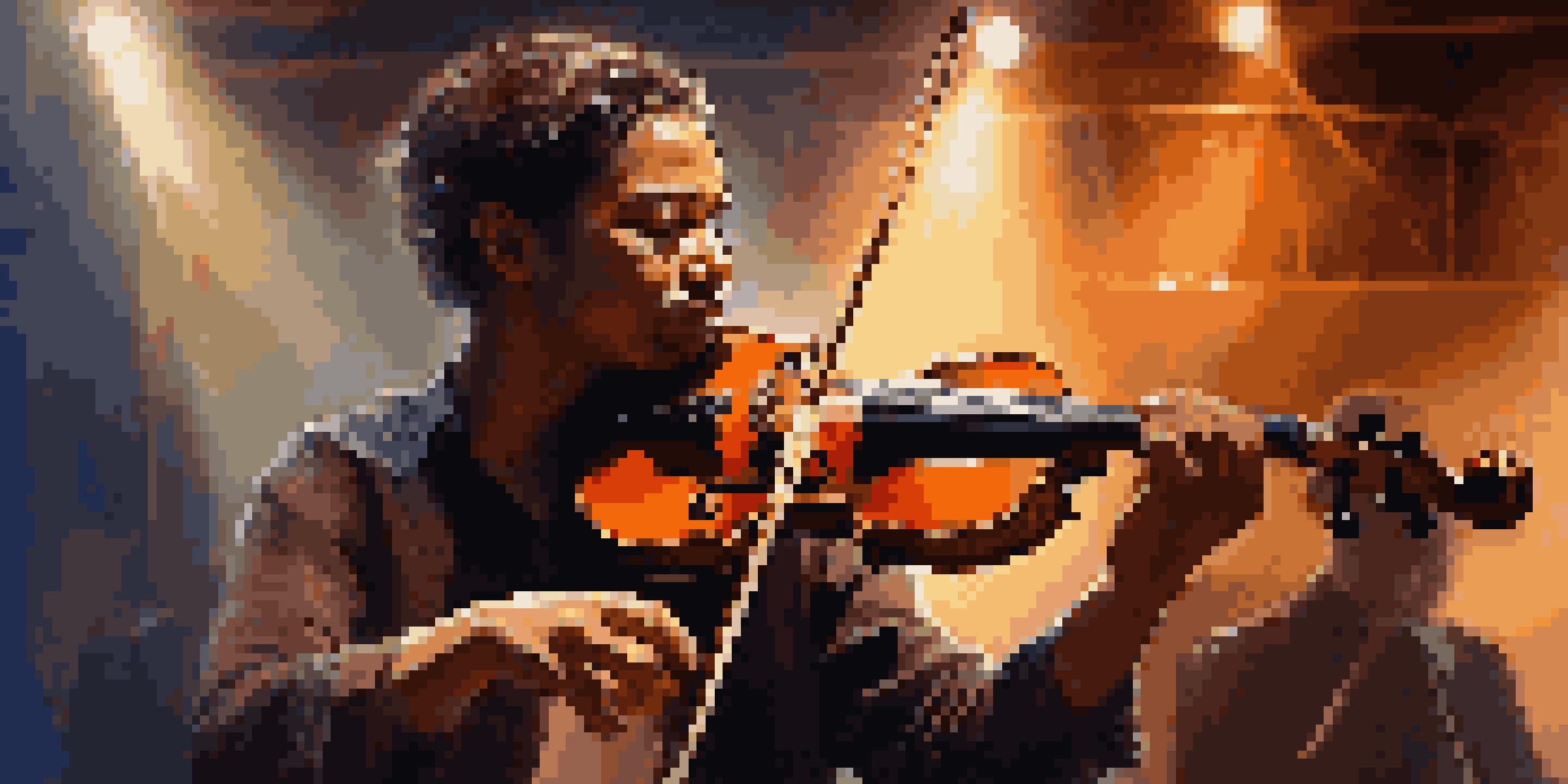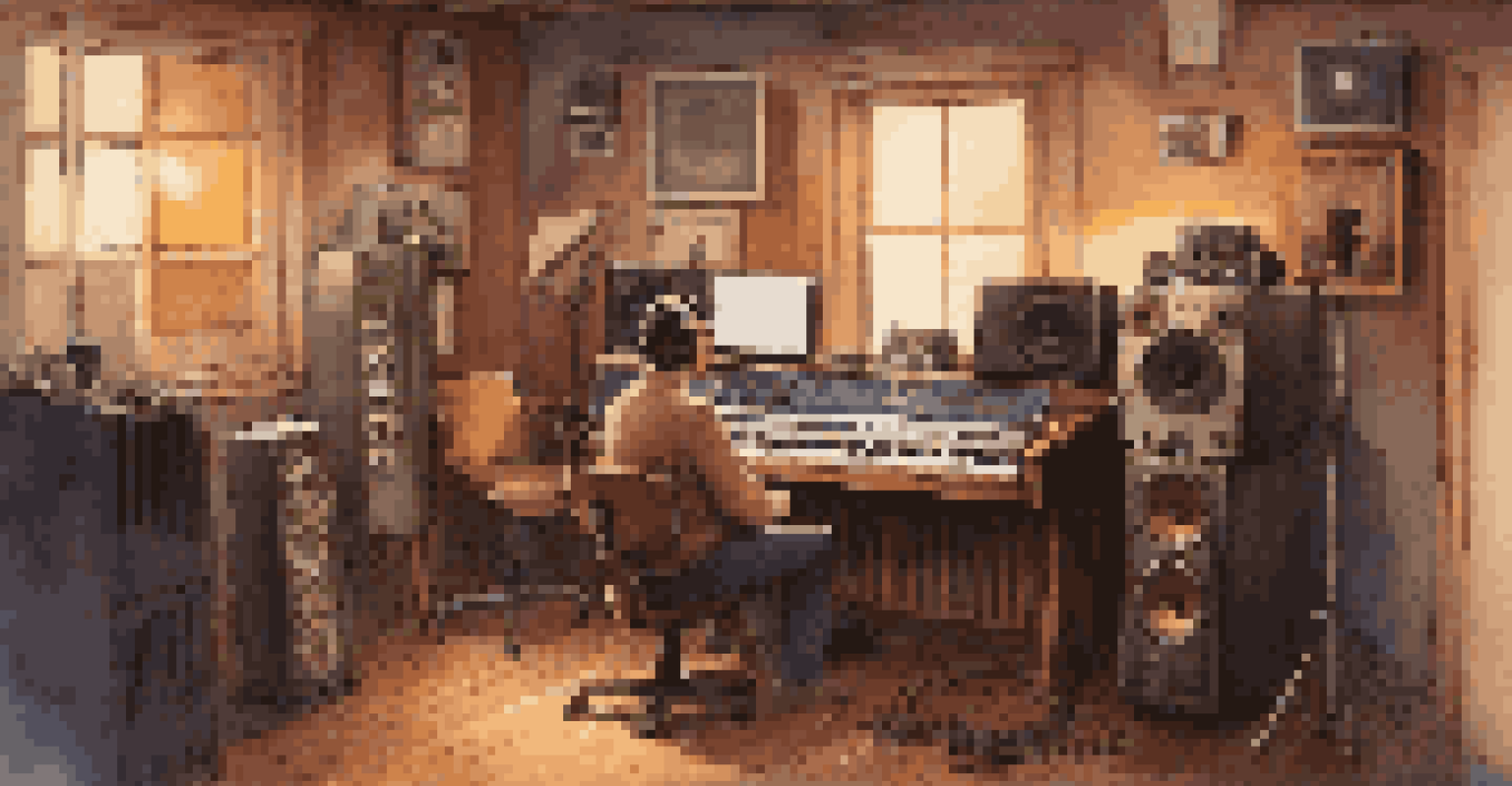How Film Music Influences Contemporary Pop Culture Trends

The Emotional Connection: Music and Audience Engagement
Film music has a unique ability to evoke emotions, creating a deeper connection between the audience and the story. Think about the heart-pounding scores in action films or the sweeping melodies in romantic dramas—these soundtracks heighten our emotional experience. This emotional engagement doesn’t just stay within the theater; it spills over into our everyday lives, influencing how we feel and react in various situations.
Music can change the world because it can change people.
For instance, a powerful score can make a scene unforgettable, embedding itself in our minds long after the credits roll. When we hear that familiar theme again, whether in a trailer or on the radio, it can transport us back to those moments. This nostalgia can shape our preferences in music and media, steering trends in pop culture as fans seek to recreate those emotional highs.
Moreover, as audiences connect with these scores, they often seek out similar styles in contemporary pop music. This is how film music can introduce new trends, with artists incorporating cinematic elements into their tracks, creating a ripple effect that can redefine genres.
Crossover Hits: Film Soundtracks and Popular Music
One of the most striking ways film music influences pop culture is through crossover hits. Songs featured in movies often gain immense popularity, leading to chart-topping success. A great example is ‘Shallow’ from *A Star is Born*, which not only dominated the charts but also became an anthem for a generation, showcasing how a film can elevate a song's reach.

These crossover hits often become cultural phenomena, leading to viral trends on social media platforms like TikTok. Users create content inspired by these songs, further embedding them into the fabric of pop culture. As these songs gain traction, they can influence fashion, dance, and even language, demonstrating the interconnectedness of film music and contemporary trends.
Music Evokes Deep Emotional Connections
Film music enhances audience engagement by evoking emotions that resonate beyond the theater.
Additionally, the success of these songs in films encourages artists to collaborate with filmmakers, resulting in a continuous cycle of innovation and creativity. This symbiotic relationship ensures that film music remains a vital part of the pop culture landscape.
Reviving Genres: Film Music’s Role in Trend Resurgence
Film music plays a crucial role in reviving musical genres that may have faded from mainstream popularity. For example, the resurgence of orchestral music in contemporary films has led to a renewed interest in classical and instrumental genres. When audiences hear these rich, cinematic scores, they often seek out similar music, reigniting interest in these styles.
The power of music makes all the difference in the world.
A notable instance is the resurgence of synthwave, which saw a significant boost thanks to films like *Drive* and *Stranger Things*. The nostalgic soundtracks of these projects have not only influenced other filmmakers but also inspired musicians to create new works reminiscent of the 80s synth era. This revival shows how film music can act as a time capsule, bringing back styles and sounds from the past.
Consequently, these revivals often influence fashion and art, as trends from the revived era seep into contemporary culture. In this way, film music becomes a gateway to exploring and appreciating music history.
Social Commentary: Film Music and Cultural Reflection
Film music often serves as a mirror reflecting societal issues and cultural shifts. Composers and artists use their music to comment on current events, evoking awareness and sparking conversations. For instance, the use of protest songs in films can resonate deeply, encouraging audiences to engage with social justice themes in a powerful and relatable way.
Consider how the soundtrack for a film like *Black Panther* blended traditional African music with contemporary hip-hop. This fusion not only celebrated cultural identity but also highlighted the importance of representation in cinema and music, influencing a broader cultural dialogue. As audiences connect with these messages, they’re often inspired to support similar movements in real life.
Crossover Hits Shape Pop Culture
Songs from films often achieve chart-topping success and become cultural phenomena, influencing trends in various aspects of society.
This relationship between film music and social commentary illustrates how soundtracks can be more than just background noise; they can become anthems for change, influencing the themes and narratives explored in contemporary pop culture.
The Global Influence: Film Music Beyond Borders
Film music's impact extends far beyond Hollywood, as global cinema introduces diverse sounds and styles into mainstream culture. With the advent of streaming platforms, audiences are now exposed to soundtracks from international films, fostering an appreciation for different musical traditions. This exposure can lead to a blending of genres, as artists around the world collaborate and innovate.
For example, the global success of films like *Parasite* has brought Korean music into the spotlight, influencing everything from pop to hip-hop in the West. As these sounds become more mainstream, they not only enrich our musical landscape but also encourage cultural exchange and understanding.
This cross-pollination of musical styles ensures that film music remains a dynamic force in shaping contemporary trends, allowing for a richer, more diverse pop culture experience.
The Role of Technology: Streaming and Music Discovery
In today’s digital age, technology plays a pivotal role in how film music influences pop culture. Streaming services have made it easier than ever for audiences to discover and enjoy soundtracks, often leading to increased popularity for featured artists. Playlists curated around films can introduce listeners to new genres and artists they might not have encountered otherwise.
Moreover, social media platforms allow film music to go viral, creating trends that spread like wildfire. A memorable scene or score can become a meme, leading to a surge in streaming numbers for the associated soundtrack. This instant accessibility means that the impact of film music can be immediate and widespread, shaping trends in real-time.
Global Soundtracks Promote Diversity
International film music fosters appreciation for diverse musical traditions, enriching the contemporary cultural landscape.
As audiences engage with film music online, they often share their favorite tracks, discuss their meanings, and create content inspired by these pieces. This interaction fosters a community of fans who are eager to explore the music further, amplifying its influence on contemporary culture.
Collaborations: The Intersection of Film and Music Industries
The collaboration between filmmakers and musicians has never been more prominent. Many artists are now composing original pieces for films, blurring the lines between music and cinema. This partnership not only enhances the storytelling experience but also allows musicians to reach new audiences, solidifying their place in pop culture.
Take, for instance, the partnership between artists like Billie Eilish and film franchises like *James Bond*. Eilish’s theme for *No Time to Die* not only showcases her unique style but also connects her music with a storied cinematic legacy. Such collaborations create a buzz around both the film and the artist, driving interest and engagement from fans.

These intersections encourage innovation, as both industries learn from each other and evolve. As a result, we see a richer tapestry of sound and vision, ultimately influencing contemporary trends and shaping the cultural conversation.